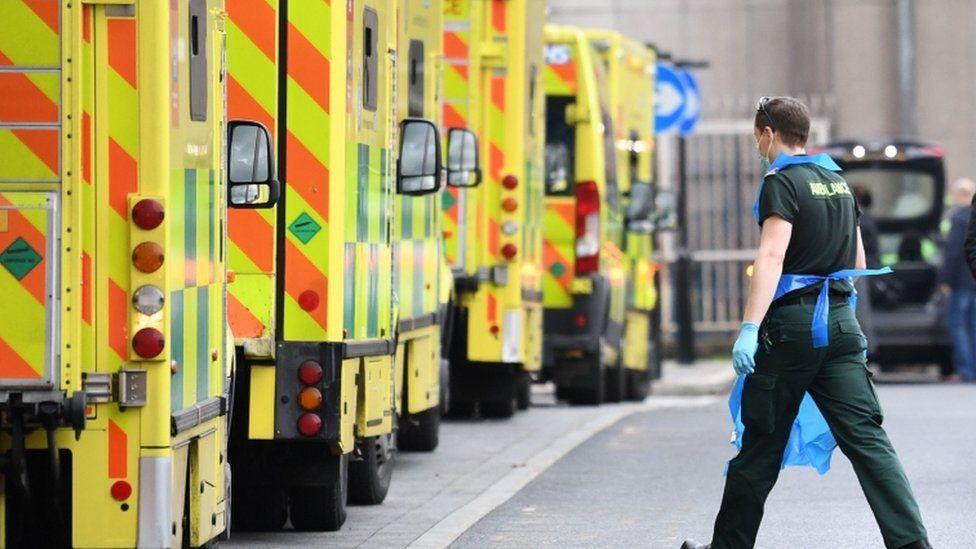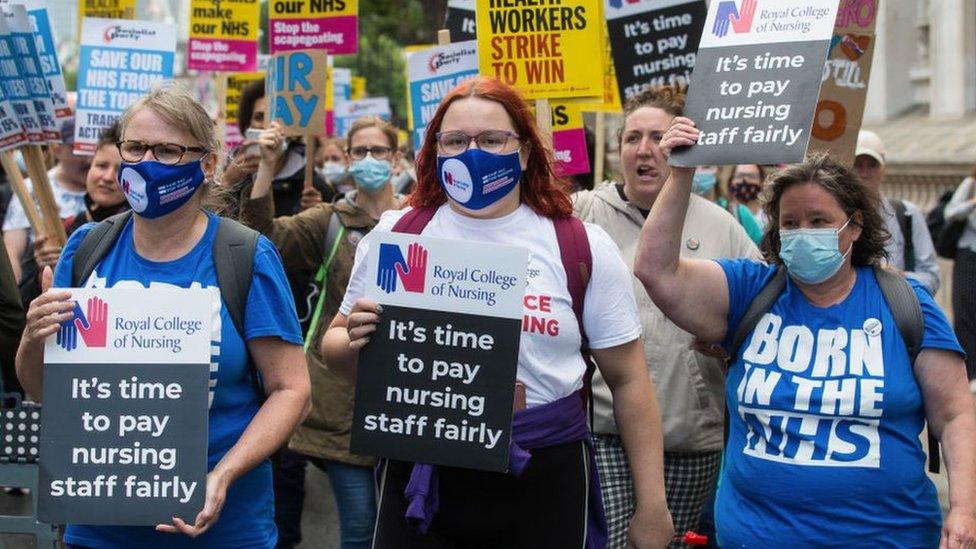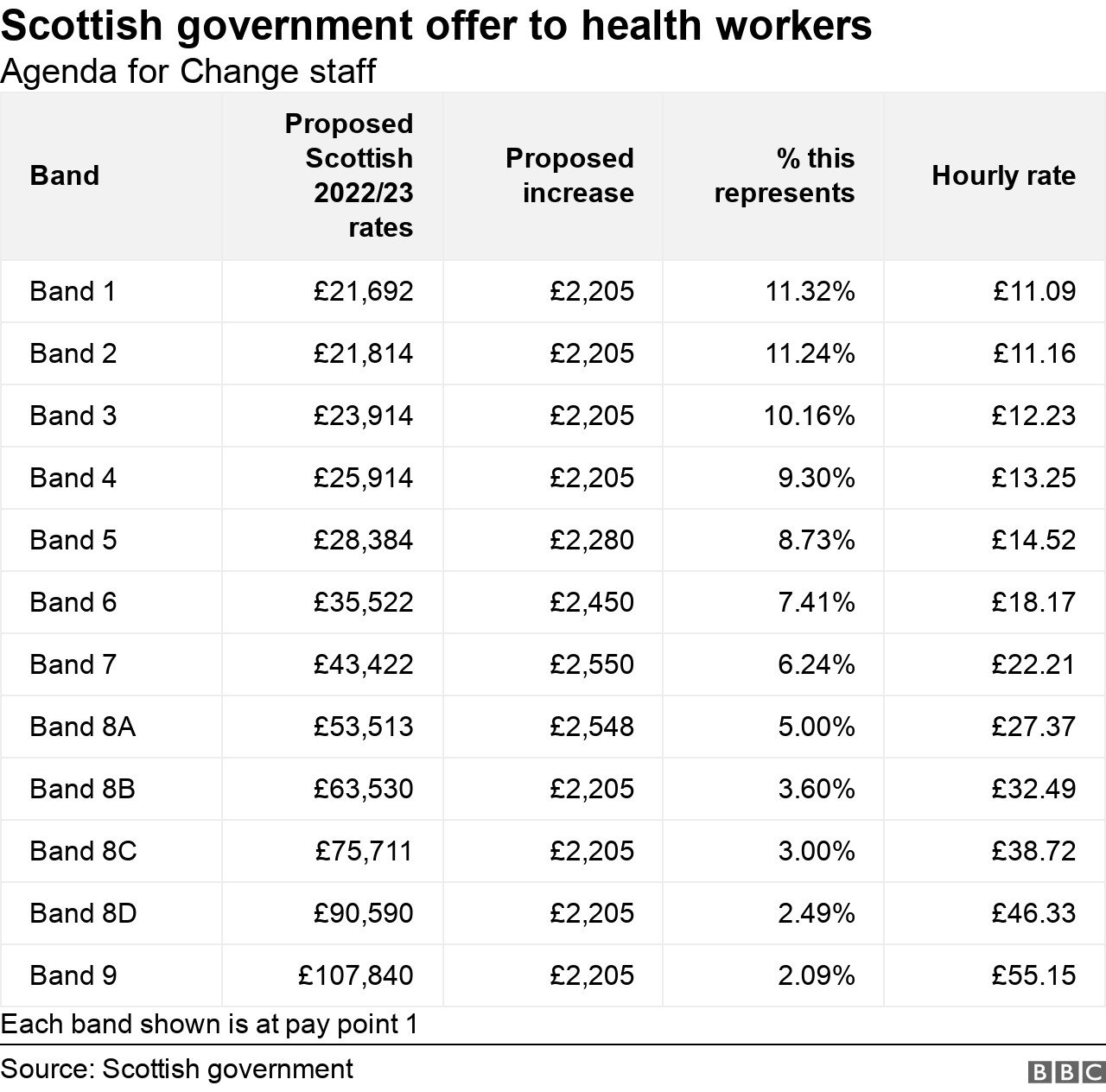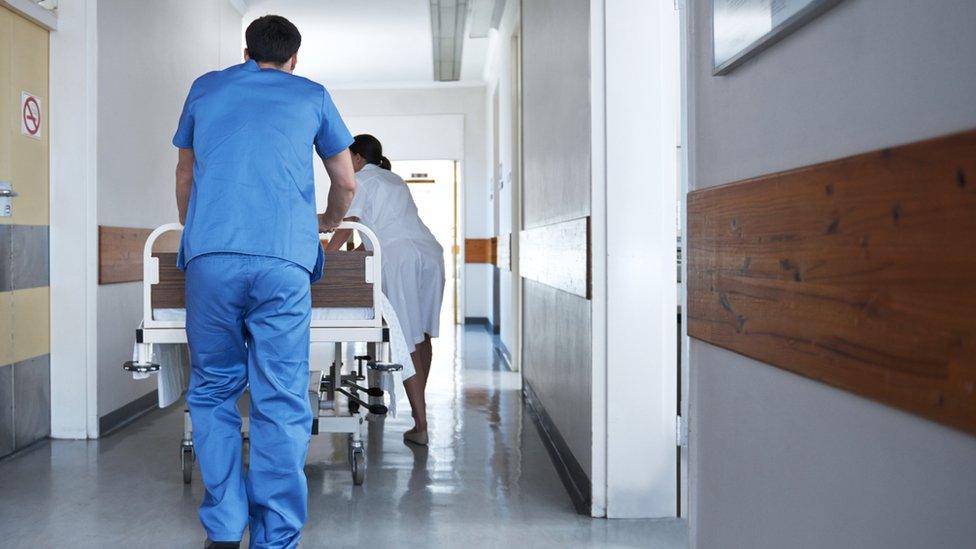Two NHS Scotland unions accept 7.5% pay deal
- Published

Members of two major NHS unions in Scotland have voted to accept an improved pay offer.
This ends the risk of strike action in the health service by members of Unite and Unison.
But ballots of GMB, Chartered Society of Physiotherapy (CSP) and Royal College of Nursing (RCN) members are ongoing.
Health Secretary Humza Yousaf welcomed the decision by Unite and Unison to accept the "record pay offer".
Last month the Scottish government tabled an improved deal averaging 7.5% to health workers threatening industrial action.
It will see most NHS staff in Scotland get a rise of just over £2,200 a year.
Unite represents about 1,500 Scottish Ambulance Service staff including paramedics, advanced practitioners, planners and administrative workers.
It confirmed 64% of its health membership voted to accept the proposal which was tabled following talks involving unions, First Minister Nicola Sturgeon, Health Secretary Humza Yousaf and NHS Scotland.
Sharon Graham, Unite general secretary, said: "The improved offer for NHS Scotland workers which is worth over 11% for the lowest pay bands is a testament to the resolve of our members.
"They were prepared to take the difficult step in taking industrial action but only because they had no other option left.
"Unite makes no apologies for fighting for better jobs, pay and conditions in the health service because NHS Scotland workers should be fairly rewarded for the outstanding work that they do day in and day out."

The Royal College of Nursing has voted to take strike action
Unison, Scotland's largest NHS union, announced that 57% of health members voted to accept the offer after a digital ballot closed at noon.
The union said negotiators would now work with the Scottish government, NHS employers and other unions to process the pay award as soon as possible.
Wilma Brown, chairwoman of Unison's Scotland's health committee said: "Whilst this decision ends the immediate threat of industrial action, it is not a win for government - it is a warning.
"It was far from a unanimous decision and many of the NHS professional grades feel badly let down.
"Almost half of Unison NHS staff voted to reject this latest pay offer, and many who did vote to accept, did so reluctantly."
Unison Scotland represents 50,000 NHS workers including nurses, midwives and support staff, such as domestics, porters and administrative workers.


The Scottish government will be hugely relieved that Unison and Unite members have accepted the latest pay offer.
But it does not mean the threat of industrial action in the NHS has gone.
The GMB will say on Wednesday whether its members have voted for the deal. A ballot by the Royal College of Nursing continues until next Monday.
The RCN result in particular is not a foregone conclusion.
Still the pay deal accepted by Unison and Unite will be looked at closely by their colleagues in the rest of the UK.
It is likely to be a line in the sand for them - something they can judge their offers against.
It will also give negotiators an insight into the least amount that might be acceptable to their members.

GMB Scotland last month suspended a 26-hour ambulance strike and has put the new deal to more than 4,000 members in a vote.
Senior organiser Keir Greenaway said staff needed to be valued to "tackle the chronic understaffing crisis across NHS front line services" after a decade of cuts and the Covid pandemic.
The union is expected to announce the results of its ballot on 14 December.
The CSP's consultation will also close on Wednesday. It has recommended its members accept the pay offer.
Meanwhile, the RCN, which has yet to confirm strike dates after members across the UK voted for action, said the new deal "still does not meet our members' expectations".
It had asked for at least 5% above inflation, which is currently 11.1%.
The RCN's ballot of its 30,000 NHS members closes on 19 December but it is not clear when the result will be announced.
'Engaged tirelessly'
The Scottish government previously said the new deal was an unprecedented pay deal for front-line employees, including nurses, paramedics, allied health professionals and healthcare support staff.
Annual pay rises under the latest deal would range from a flat rate payment of £2,205 for staff in Bands 1 to 4 and up to £2,660 for staff in Bands 5 to 7, backdated to April.
This represents an increase of 11.3% for the lowest paid workers and delivers an average uplift of 7.5%, a government spokesperson said.
Mr Yousaf said: "We have engaged tirelessly with trade union representatives over recent weeks, leaving no stone unturned to reach an offer which responds to the key concerns of staff across the service.
"This offer of over half a billion pounds underlines our commitment to supporting our fantastic NHS staff."
He added that a newly qualified nurse would see a pay rise of 8.7%, and experienced nurses and would get uplifts of between £2,450 and £2,75.
The health secretary said: "We are making this offer at a time of extraordinary financial challenges to the Scottish government to get money into the pockets of hard working staff and to avoid industrial action, in what is already going to be an incredibly challenging winter."

- Published24 November 2022

- Published21 November 2022

- Published15 November 2022

- Published9 November 2022
